
By the 1939-40 season, the pattern which had been established within the previous two years had become standard at Termite Terrace. There would be somewhere between a dozen and 16 black and white Looney Tunes, and between two dozen and 30 Merrie Melodies in color. What’s more, the use of Warner songs in the cartoons became more sophisticated. Action and gags no longer had to stop cold for music, and Carl Stalling more consistently used numbers as leitmotifs in a more natural manner to establish character or mood.

Porky’s Hotel (9/2/39) – Porky is trying to run a hotel at Donut Center (What a Hole!). A customer of his establishment is Gouty Goat, a curmudgeonly character in a wheelchair with one foot totally bandaged, who has come there for peace and quiet. This will be difficult with newcomer Gabby Duck endlessly asking questions about Gouty’s foot. Songs include “Honeymoon Hotel” with special lyrics, and “You Don’t Know How Much You Can Suffer” – a number anyone who’s ever endured a session of the gout can appreciate.
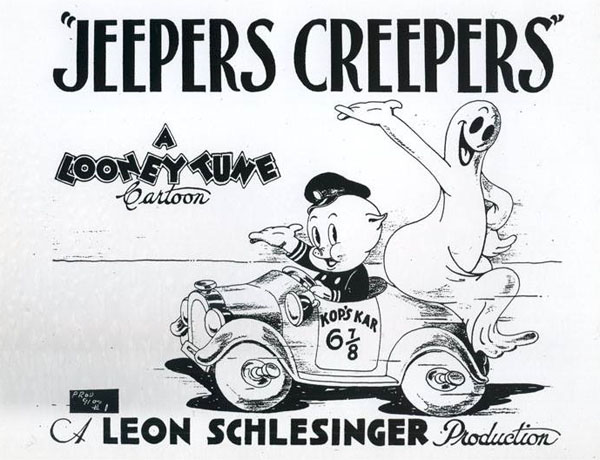
Jeepers Creepers (9/23/39) – Officer Porky investigates a haunted house, with a ghost (“You know, hose white things that go ‘WHOOOOOOO’!”), reportedly voiced by Pinto Colvig, though I wonder if this time it’s Mel doubling. Some gags borrowed from Case of the Stuttering Pig in a staircase chase. Songs: The title number with special lyrics, also introducing “A Hunting We Will Go” reworded as “A-Haunting”.
Naughty Neighbors (10/7/39) – Porky and Petunia settle a longstanding feud between their mountain families. But some of their farm animals are just more used to fightin’ – and a fussin’. Does not appear to borrow too many gags from the studios’s earlier feud cartoons. Songs include a production number on “Would You Like To Take a Walk?”, a 1939 pop song Stalling must have remembered, recorded widely by Rudy Vallee on Victor, Ben Selvin on Columbia, and as a vocal by Annette Hanshaw (Harmony, Velvet Tone, and Clarion) and by Frank Crumit and Julia Sanderson on Victor. “When I Yoo Hoo” is revived, and “Monday Morning” is included.
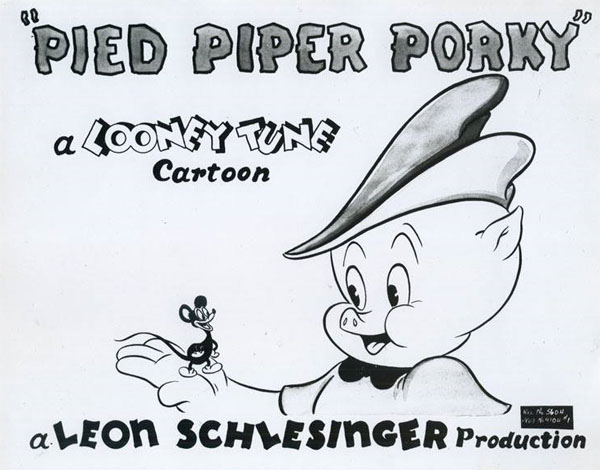
Pied Piper Porky (11/4/39) – Piper Porky has rid the town of rats – save one – a sassy rat with voice mirroring Eddie “Rochester” Anderson. Porky attributes his success to “I blew some corn right through my horn”, actually a clarinet. The rat breaks the instrument in two, and says it’s “No good. Full of holes.” Porky resorts to an old fshioed mousetrap, a cat he refers to as “Slappy Katsy” (a reference to Slapsie Maxie Rosenbloom, an ex-champion prize righter who displayed an open-glove style of boxing leading to his nickname). The cat nearly loses all of his nine lives in battle with the rat, but is revived by Porky’s bottle of “Kat-Nip – 100% pure (Dynamite)”. However, the rat emerges from the final bout wearing a cat fur which he describes as “genuine ermine”. Songs: extended passages from the final movements of Mendelssohn’s Violin Conncerto in E Minor accompany the open credits. “The Umbrella Man” is used as a clarnet lure for the rodent. Also a swing arrangement of “Here We Go Round the Muberry Bush” with special lyrics accompanies Porky’s press conference with the townsfolk.
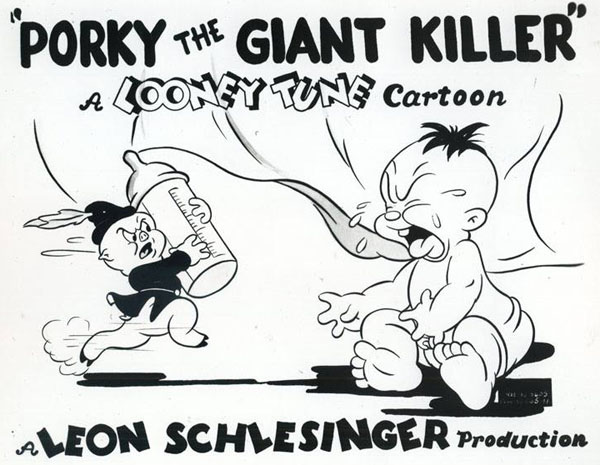
Porky the Giant Killer (11/18/39) – Porky joins a mob of villagers who intend to destroy the giant living in a big castle on a hill. The giant is father to a toddler who alteay stands 6′ 7″. The giant never stoops to grinding bones for bread, and when Porky is left behind by the fleeing villagers, the giant discovers Porky’s playing on a toy piano is a great pacifier for the baby’s wailing. Like it or not, Porky becomes the permanent baby-sitter (“Everything seems to happen to me.”) Songs; “The Alphabet Song” (aka “Twinkle Twinkle Little Star”), sung by Porky, “You Must Have Been a Beautiful Baby” (from the Warner feature Hard To Get), and “Monday Morning”.

The Film Fan (12/16/39) – Little boy Porky has been sent to the store by his mother to get “a loaf of bread, a bottle of milk, and come home right away”. He is distracted, however, by a movie house offering free admission for kids. Parodies of newsreels and shorts abound, with some gags borrowed from “She Was An Acrobat’s Daughter”. When Mama calls the theatre to inquire about Porky’s whereabouts, the management announces that if there is a little boy in the theatre who was sent to the store by his mother, he’d better come home. The entire audience disappears in the twinkling of an eye, and the theatre deflates. Songs: “You Ought To Be In Pictures”; “There’s a Brand New Picture In My Picture Frame” with special lyrics – this song was recorded by Freddy Martin on Bluebird, Larry Clinton on Victor, Russ Morgan on Decca, Horace Heidt on Brinswick, Bunny Berigan on Thesaurus Transcriptions, and Dick Jurgens also on a radio transcription; and “Through the Courtesy of Love”.
Porky’s Last Stand (1/6/40) – Porky runs a diner in an isolated town. Daffy is also present as cook and waiter, with gags abounding as he finds his cupboard bare (with a note reading “Now you know how Mother Hubbard felt – signed, The Mice”. A customer insists on “a good hamburger – and I want it bad”, prompting Daffy to hunt some beef in the raw in the form of a local bull. Songs: “With Plenty of Money and You” (with special lyrics), “I’d Love To Take Orders From You”, plus two fairly recent numbers, “Start the Day Right”, recorded by Bing Crosby and Connee Boswell on Decca as a vocal, and by Guy Lombardo on the same label as a dance arrangement (see below), and “All In Favor Say Aye”, recorded by Orrin Tucker on Columbia.
 Africa Squeaks (1/27/40) – A spoof of a picture from the previous year, “Stanley and Livingston”. Borrows one gag from “Porky In Wackyland” – the “Dark, Darker, and Darkest Africa” bit. Much of it has become politically incorrect over the years. It also features a topical takeoff on Kay Kyser and his Kollege of Musical Knowledge, caricaturing him as “Cake-Icer” and using one of his catch phrases, “That’s wrong. You’re right!” Songs include “Congo”, “We’re Working Our way Through College”, and “You’re the Greatest Discovery (since 1492)”, a song which the real Kay Kyser recorded for Columbia, and Jimmy Dorsey on Decca, and also by Sterling Young and his orchestra on radio transcription.
Africa Squeaks (1/27/40) – A spoof of a picture from the previous year, “Stanley and Livingston”. Borrows one gag from “Porky In Wackyland” – the “Dark, Darker, and Darkest Africa” bit. Much of it has become politically incorrect over the years. It also features a topical takeoff on Kay Kyser and his Kollege of Musical Knowledge, caricaturing him as “Cake-Icer” and using one of his catch phrases, “That’s wrong. You’re right!” Songs include “Congo”, “We’re Working Our way Through College”, and “You’re the Greatest Discovery (since 1492)”, a song which the real Kay Kyser recorded for Columbia, and Jimmy Dorsey on Decca, and also by Sterling Young and his orchestra on radio transcription.
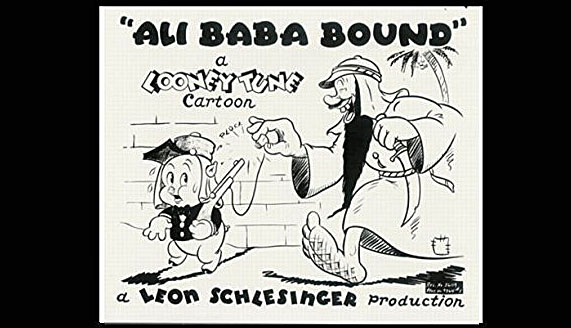
Ali Baba Bound (2/17/40) – Porky in the desert again, trying to let the soldiers in the
fort know that Ali Baba and his dirty sleeves are on the prowl again, after receiving a tip from a coin-tossing George Raft caricature, with a pocket marked “Secret messages – Take one.” Much line-mileage is given over to a mother-and-child camel combination, which Porky refers to as “Blondie” and “Baby Dumpling” – reference to the comic strip characters who had a few years before broken successfully onto the silver screen. Songs include “The Girl Friend of the Whirling Dervish” (sung by Porky), and “Vision of Salome”.
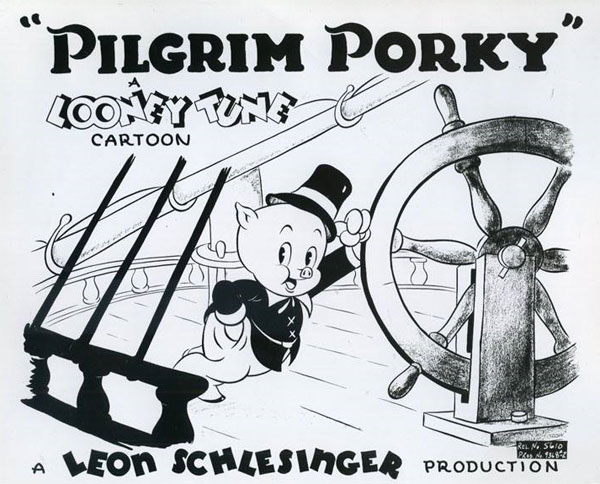
Pilgrim Porky (3/16/40) – Gags taking off on the voyage of the Mayflower, many of them anachronistic (references to “F.H.A,”, for example). Songs: “Long Long Ago”, “A Life On the Ocean Wave”, “Song of the Marines”, “My Bonnie Lies Over the Ocean”, “Jeepers Creepers”, “You Must Have Been a Beautify Baby”, and “Confidentially”.
Slap Happy Pappy (4/13/40) – Built around two facts well known to the public in 1940: (1) that Eddie Cantor had five children – all daughters, and (2) that Big Crosby had several children – all boys. Eddie “Cackler” asks Bing what to do in order to get a son. Bing recommends crooning – it may do the trick. Songs: “You Must Have Been Beautiful Baby”, “Chicken Reel”, “In an Old Dutch Garden” (recorded by Glenn Miller on Bluebird, Dick Jurgens on Vocalion, Eddy Duchin on Columbia, Russ Morgan on Decca, and in England by Victor Sylvester on Parlophone and Jack White for Regal-Zonophone) and “Confidentially” (from the Warners 1938 feature Garden Of The Moon – here with special lyric material for Eddie).
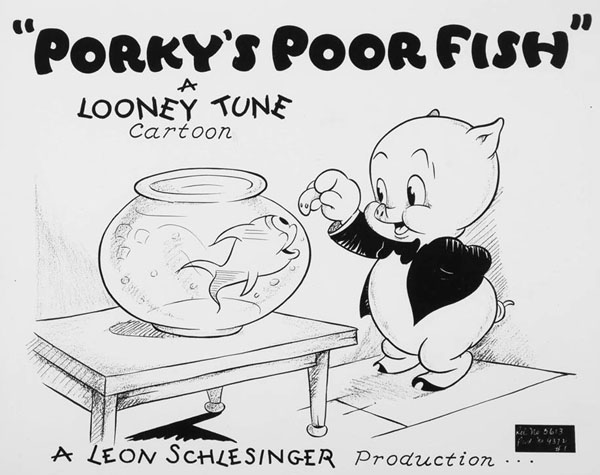
Porky’s Poor Fish (4/27/40) – Porky operates a pet shop specializing in fish. Puns abound, including “Mussels” with Popeye arms, who make use of them when a cat appears intent on satisfying his appetite. Songs include “The Girl With the Pigtails In Her Hair”, recorded by Charlie Barnet for Bluebird, Horace Heidt for Columbia, Hal Kemp for Victor, and Lawrence Welk for Vocalion; and “You, You Darlin’”, recorded by Duke Ellington on Victor with vocal by Herb Jeffries, Kay Kyser on Columbia, Jack Teagarden on Varsity, Blue Barron on Bluebird, and Bob Crosby on Decca). Here’s a double dose of tunes heard in this picture:

You Ought To Be In Pictures (5/18/40) – The landmark film in which Porky shakes hands with Leon Schlesinger. During lunchtime at the Warner studio, Daffy (on a drawing board) talks Porky into breaking his cartoon contract to go into features. Leon (in the flesh, but voiced by Mel Blanc) agrees, but knows that “He’ll be back.” Spectacular use of the animated characters cavorting on live action backgrounds, in and around the studio and on the streets of Los Angeles. Several Warner staffers appear on screen, including Michael Maltese as a studio guard). Porky finds feature work not to his liking, and returns to find Daffy vying for his old job. Porky delivers Daffy a sound thrashing, patches things up with Schlesinger (“April fool!”), and hits Daffy with a final tomato when he tries to talk him into being featured with Greta Garbo. Songs: “You Ought To Be In Pictures”, “Concert in the Park” (with special lyrics – “I’ll Be Famous On the Screen” for Daffy), “Am I Blue”, and “Home Sweet Home”.
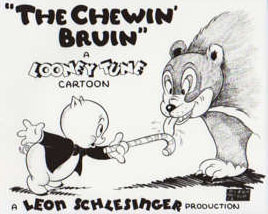 The Chewin’ Bruin’ (6/8/40) – An old grandpaw tells the tall tale of a bear who had a hankering for chewing tobacco. Spittoon gags provide running punctuation, but overall a fairly weak cartoon with little to no concentration on Porky. Songs include “For He’s a Jolly Good Fellow” – and for the first minute (after the credits) you hear “Little Old Sod Shanty On The Claim” on the soundtrack. Here’s the whole tune:
The Chewin’ Bruin’ (6/8/40) – An old grandpaw tells the tall tale of a bear who had a hankering for chewing tobacco. Spittoon gags provide running punctuation, but overall a fairly weak cartoon with little to no concentration on Porky. Songs include “For He’s a Jolly Good Fellow” – and for the first minute (after the credits) you hear “Little Old Sod Shanty On The Claim” on the soundtrack. Here’s the whole tune:
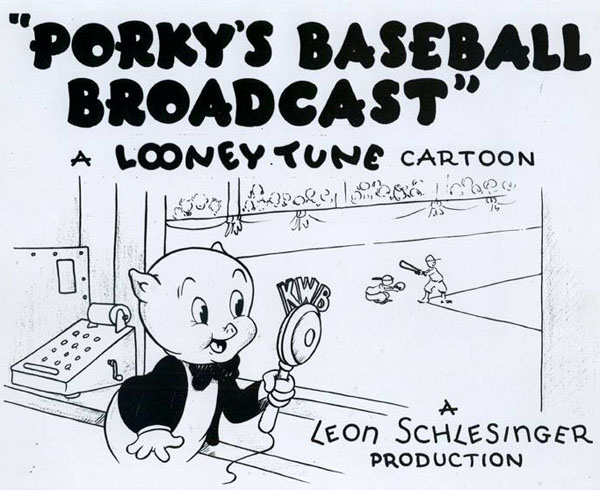
Porky’s Baseball Broadcast (7/6/40) – Broadcasts of major league baseball games had become routine by this time, and we find Porky in the booth calling play-by-play. A running gag has a fellow trying to find his seat – only to find it’s behind a pillar where he can’t see a thing – a somewhat common occurrence in older parks of the day. On the field activities almost take a back seat. A few gags would be repeated in “Baseball Bugs”. Songs include “Frat”, and “Sing, You Son of a Gun” (from “Hollywood Hotel, performed by Dick Powell, but not known to be commercially recorded).
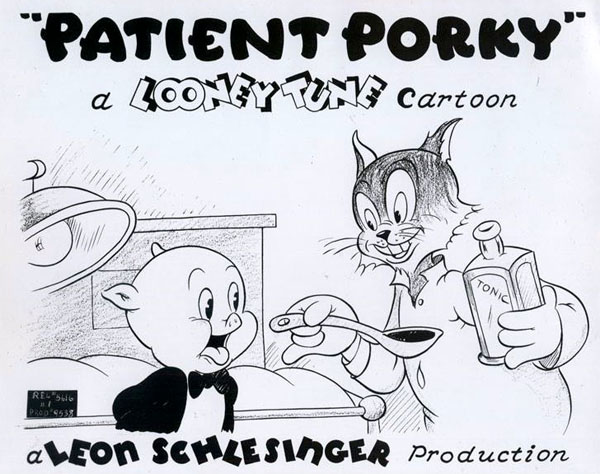
Patient Porky (8/24/40) – “I had a birthday party, and I made a p-p-pig of myself”, declares Porky at the local hospital. An x-ray reveals all but a single slice of a chocolate cake, complete with lit birthday candles, whole inside him. A nutty cat, who is actually a patient himself, decides to perform an operation, to “cut the cake”. Makes reference to two popular doctor series of the cinema – the cat calls himself Dr. Kill-dare, while the real doctor is named Dr. Chris Chum – reference to Dr. Christian, a popular radio series and RKO film series. Songs: “We’re Working Our Way Through College” (with specialty lyrics), “You Don’t Know How Much You Can Suffer”, and “Melancholy Mood” (recorded by Harry James on Brunswick with the first recorded performance by Frank Sinatra – very rare on 78; Artie Shaw on Bluebird; Ginny Simms on Vocalion; Martha Raye on Brunswick; Bob Crosby on Decca, and Jess Stacy for Varsity, and, of all things, revived by Bob Dylan in 2016!)
On Deck: Merrie Melodies 1939-40 (Part 1)
